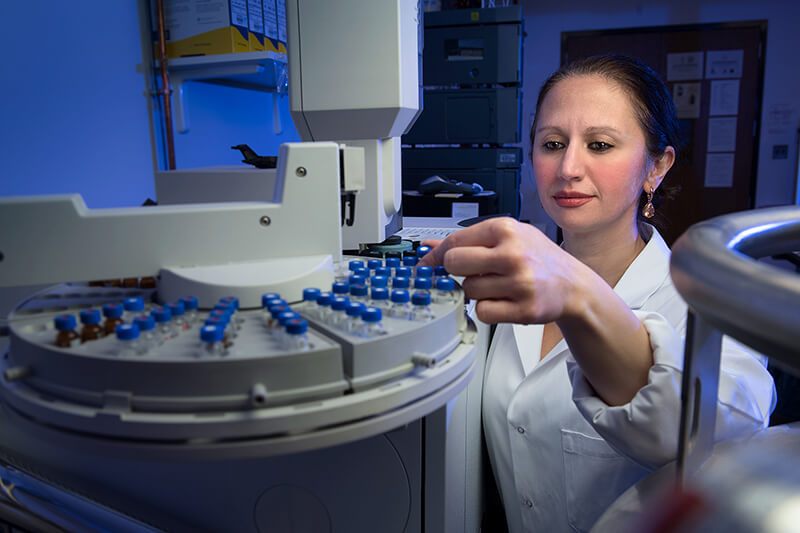November 13, 2018
Making a difference for the future: Purdue professor focuses on improving sustainability with jet fuel research

Gozdem Kilaz, an assistant professor of engineering technology in the Purdue Polytechnic Institute, examines fuel samples from a two-dimensional gas chromatography in the Fuel Laboratory of Renewable Energy. (Purdue University photo/John Underwood)
WEST LAFAYETTE, Ind. — When people talk about sustainability, jet fuel doesn’t come up in the conversation. Unless it is Gozdem Kilaz who is talking.
Kilaz, an assistant professor of engineering technology at the Purdue Polytechnic Institute, her alma mater, is head of the Fuel Laboratory of Renewable Energy. She and her group research sustainable energy and alternative liquid transportation fuels for gas turbine aircraft engines.
“We want to look at the chemical composition of a drop of fuel, just like a fingerprint, and work on predicting if the fuel is going to be stored well, if it is susceptible to corroding or not, if it is going to be safe with all the parts it comes in contact with in the aircraft,” she said.
“We’re not just trying to follow the regular path. We want to make a change. We want to make a difference.”
Kilaz believes there is more to her research efforts than a desire for knowledge or an eagerness to educate future generations.
 Future sustainable energy and alternative liquid jet fuels for large aircraft are the focus of research by Purdue Polytechnic Institute’s Gozdem Kilaz, an assistant professor of engineering technology. (Stock image)
Future sustainable energy and alternative liquid jet fuels for large aircraft are the focus of research by Purdue Polytechnic Institute’s Gozdem Kilaz, an assistant professor of engineering technology. (Stock image)
Instead, she says those in the position of professor have a responsibility to use their knowledge to make a difference.
“As scientists, I don’t think we can just sit on the corner and say ‘I’m a professor. I’m going to research all this information and decide all these formulas and feel great about it,’” Kilaz said. “Knowledge bring a lot of responsibility and if I have some part in this development in U.S. sustainability and economic growth, that is exactly what we’re here for.”
Her work aligns with Purdue’s Giant Leaps celebration, acknowledging the university’s global advancements made in health, space, artificial intelligence and sustainability as part of Purdue’s 150th anniversary. Those are the four themes of the yearlong celebration’s Ideas Festival, designed to showcase Purdue as an intellectual center solving real-world issues.
Aviation fuels act as the power source as well as the hydraulic fuels and cooling medium for aircraft. Kilaz is working toward sustainability in terms of renewable liquid transportation fuels by researching the properties and performance of a fuel and matching it to its exact chemical composition.
“When dealing with sustainability, it’s a very difficult, hard to achieve goal,” Kilaz said. “We have to prove the rest of the world that it makes sense with respect to economy, people and the environment.”
But understanding what factors into a fuel’s performance could offer avenues in determining lower development costs of alternatives and dependence on crude oil sourced from other countries.
“Sustainability is a subset of all the good things that takes us away from the petroleum use and gives us domestic energy security, environmental advantages, lower emissions and the feedstock is never going to diminish.”
Kilaz said the FLORE lab is one of four labs in the nation with the advanced instruments for the fuel research being conducted.
The regulations to approve the use of new fuel options are stringent, with four separate tiers of testing before the fuel is approved for use. Part of Kilaz research is to create a more efficient testing system for alternative fuels.
For Kilaz, sustainability is important in order to find renewable fuel options for future generations.
“What we do matters,” she said. “We need to have a big impact, take a giant leap with our work.”
Writer: Brian Huchel, 7865-494-2084, bhuchel@purdue.edu
Source: Gozdem Kilaz, 765-491-6912, gkilaz@purdue.edu

